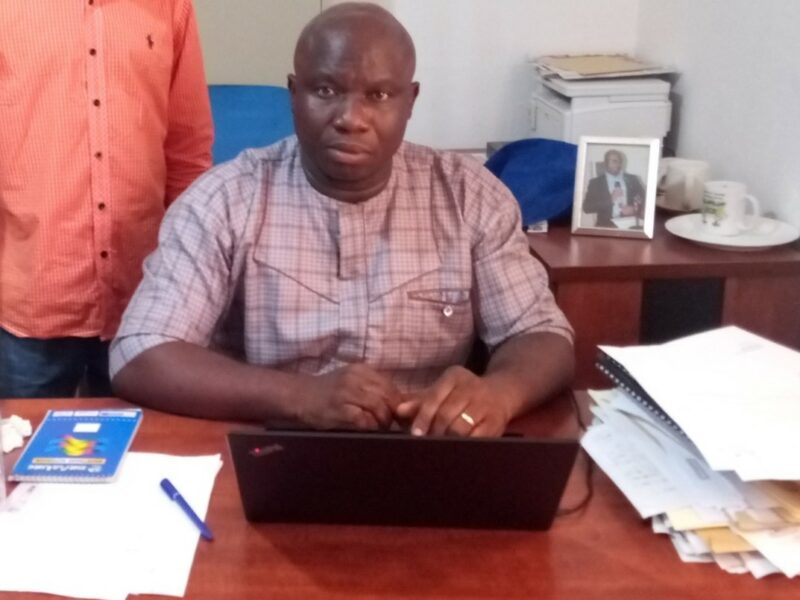Sierra Leonean academic calls for human rights journalism
Mainstream journalism needs a complete overhaul if it is to survive as a legitimate voice of society, according to a Sierra Leonean academic at Northumbria University.
In his new book, Human Rights Journalism: Advances in Reporting Distant Humanitarian Interventions , Dr Ibrahim Seaga Shaw explores the role of the media in relation to human rights issues, making the case for the adoption of a new model of human rights journalism.
His outlook has been shaped by his own experiences as editor of an award-winning newspaper inSierra Leoneduring the mid-1990s. His advocacy for a peaceful resolution between the rebels and the government during the build up to civil war found him imprisoned on several occasions, labelled a ‘collaborator’ of the military junta.
Forced into exile in 1998, Dr Shaw, now a Senior Lecturer in Media and Politics, was motivated to write a book exploring the role of the media in the promotion and protection of human rights.
He argues that mainstream media and journalism panders to stories that governments and companies want them to write rather than highlighting the real issues affecting the grass roots communities.
“The way journalism is being practiced at the moment is problematic because the focus is on drama with very little context,” he says. “Mainstream journalists tend to focus more on corporate interests rather than the public interest. They prioritise issues that are reactive and there is very little context in terms of really exploring what is going on.”
The new human rights model of journalism that Dr Shaw advocates would be proactive in challenging, not reinforcing, political and economic imbalances. It addresses latent issues before they lead to violent manifestations and fully articulates the causes and exacerbating factors behind the dramatic flashpoints that the mainstream media usually focuses on.
Dr Shaw blames the decline in newspaper readership on the public’s isolation from an increasingly elitist media that does not hold the public interest as a priority. He explains: “Mainstream journalism does not pry into the structural problems affecting ordinary people – social and economic injustice – which, if not managed, can turn into very serious problems or violence.”
Describing the mainstream media’s reports of the ‘Arab Spring’ and Libyan intervention as an example of ‘human wrongs’ journalism, he alleges that political, economic, social and cultural factors – not human rights concerns – drive the mainstream journalists to call for intervention in one conflict and not another.
Dr Shaw argues: “The role of the media during the Arab Spring involved pandering to the official line. Of course there will always be a national interest involved but journalists must balance this with their social responsibility as the ‘fourth estate’ to report on social and global injustice.
“Human Rights was used as a smokescreen for NATO’s motivations and objectives for intervention in Libya. There has been an undercurrent reading of the situation with some suggesting that Gaddafi’s regime was targeted not because of his human rights because he refused to allow aUSdrone base to be installed inLibya. This needs to be investigated objectively by journalists. The issues of oil dominance, with the Arab countries not wanting a strong African oil competitor to emerge, are also factors that haven’t been delved into deeply enough in the mainstream media.”
Human Rights Journalism: Advances in Reporting Distant Humanitarian Interventions’ is published by Palgrave Macmillan. It is intended for use by students of journalism, media and cultural studies, media and politics, media and human rights, media and development, media, risk and conflict, media ethics, and political communication. It is also a useful guide for journalists interested in the reporting of human rights issues broadly speaking and for press officers working for UN agencies and humanitarian relief organisations. The book was published on November 14 2011 and released for distribution by Amazon and other leading international suppliers four days later.
Dr Ibrahim Seaga Shaw is a member of the Governing Council of the International Peace Research Association (IPRA) and co-convener of the Peace Journalism Commission at the next IPRA conference to be held inJapanin November 2012. He is a co-editor of the forthcoming book Expanding Peace Journalism (UniversityofSydney Press).
Stay with Sierra Express Media, for your trusted place in news!
© 2011, https:. All rights reserved.






